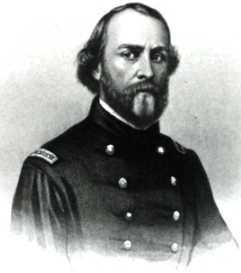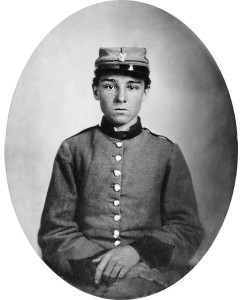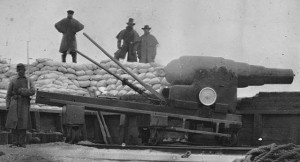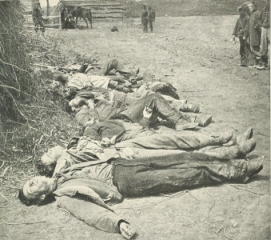“If I do not return, my dear Sarah, never forget how much I loved you, nor that when my last breath escapes me on the battle field, it will whisper your name …”
Letters Home To Loved Ones
During the Civil War, the young Yankee and Rebel soldiers most likely were far away from home for the first time in their lives. It was common before the war, for these young soldiers never to have traveled more than 25 miles away from their homes. Now, they could find themselves hundreds of miles away from their loved ones and homes. Understandingly, these young men often suffered from homesickness.
To keep in touch with their loved ones, the soldiers, and their families wrote letters back and forth. Pen and ink were often not available, so most of the handwritten letters were in pencil. Rough handwriting and phonetic spelling are common in these letters. For the Union, 90,000 letters went through Washington, D.C. daily. In Louisville, Kentucky 180,000 Union letters passed through daily.
Major Sullivan Ballou
Major Sullivan Ballou of the 2nd Rhode Island Volunteers was 32-years-old at the beginning of the Civil War. He was born in Smithfield, Rhode Island and after attending the National Law School in Ballston, New York he was admitted to the Rhode Island Bar. Ballou married Sarah on October 15, 1855 and they had two sons, Edgar and William. Ballou was a Republican and a strong supporter of President Abraham Lincoln. He volunteered the spring of 1861. He and his men left Providence, Rhode Island for Washington, D.C. on June 19.
Major Sullivan Ballou’s Letter To Home
As what would become known as the First Battle of Bull Run (the Confederates called the same battle the First Battle of Manassas) approached, Sullivan Ballou wrote a letter to his wife back home in Smithfield. On July 14, 1861 Ballou wrote to Sarah as he sat alone in a tent at Camp Clarke in Washington, D.C., Ballou knew that the army would soon be moving southward against the Confederates, and that he would soon see battle. We’ll never know for sure, but perhaps he had a premonition of death, because he now took the opportunity to write a touching letter to his wife. In the letter, Ballou writes of his love for Sarah, and of his duty to his country.
Many are familiar with the Sullivan Ballou letter from hearing it during Ken Burns’ documentary The Civil War which aired in 1990. The letter was introduced by narrator David McCullough, and read by Paul Roebling with Jay Ungar’s Ashokan Farewell playing in the background. It only caught the hearts of everyone who heard it. The Sullivan Ballou letter is perhaps the most emotional and memorable letter written by a soldier in the Civil War.
The version of the Sullivan Ballou letter heard in The Civil War documentary was a shortened one. Some of Ballou’s words about his family and childhood are missing from the television presentation of the letter. In fact, the original Sullivan Ballou letter apparently did not survive, and has been lost to history. There are many versions of the letter to be found today, but it is unknown which is most similar to the original written by Ballou.
A Reading and Performance of the Sullivan Ballou Letter
The Sullivan Ballou Letter As Heard In The Civil War Documentary:
July 14,1861
Washington, DC
Dear Sarah:
The indications are very strong that we shall move in a few days – perhaps tomorrow. And lest I should not be able to write you again I feel impelled to write a few lines that may fall under your eye when I am no more.
I have no misgivings about, or lack of confidence in the cause in which I am engaged, and my courage does not halt or falter. I know how American Civilization now leans upon the triumph of the government and how great a debt we owe to those who went before us through the blood and suffering of the Revolution. And I am willing – perfectly willing – to lay down all my joys in this life, to help maintain this government, and to pay that debt.
Sarah, my love for you is deathless, it seems to bind me with mighty cables that nothing but omnipotence can break; and yet my love of Country comes over me like a strong wind and bears me irresistibly with all those chains to the battlefield. The memory of all the blissful moments I have enjoyed with you come crowding over me, and I feel most deeply grateful to God and you, that I have enjoyed them for so long. And how hard it is for me to give them up and burn to ashes the hopes and future years, when, God willing, we might still have lived and loved together, and see our boys grown up to honorable manhood around us.
If I do not return, my dear Sarah, never forget how much I loved you, nor that when my last breath escapes me on the battle field, it will whisper your name…
Forgive my many faults, and the many pains I have caused you. How thoughtless, how foolish I have sometimes been!…
But, 0 Sarah, if the dead can come back to this earth and flit unseen around those they love, I shall always be with you, in the brightest day and in the darkest night… always, always. And when the soft breeze fans your cheek, it shall be my breath, or the cool air your throbbing temple, it shall be my spirit passing by.
Sarah, do not mourn me dead; think I am gone and wait for me, for we shall meet again…
Sullivan
A Longer Version of the Sullivan Ballou Letter:
July the 14th, 1861
Washington D.C.
My very dear Sarah:
The indications are very strong that we shall move in a few days—perhaps tomorrow. Lest I should not be able to write you again, I feel impelled to write lines that may fall under your eye when I shall be no more.
Our movement may be one of a few days duration and full of pleasure—and it may be one of severe conflict and death to me. Not my will, but thine O God, be done. If it is necessary that I should fall on the battlefield for my country, I am ready. I have no misgivings about, or lack of confidence in, the cause in which I am engaged, and my courage does not halt or falter. I know how strongly American Civilization now leans upon the triumph of the Government, and how great a debt we owe to those who went before us through the blood and suffering of the Revolution. And I am willing—perfectly willing—to lay down all my joys in this life, to help maintain this Government, and to pay that debt.
But, my dear wife, when I know that with my own joys I lay down nearly all of yours, and replace them in this life with cares and sorrows—when, after having eaten for long years the bitter fruit of orphanage myself, I must offer it as their only sustenance to my dear little children—is it weak or dishonorable, while the banner of my purpose floats calmly and proudly in the breeze, that my unbounded love for you, my darling wife and children, should struggle in fierce, though useless, contest with my love of country?
I cannot describe to you my feelings on this calm summer night, when two thousand men are sleeping around me, many of them enjoying the last, perhaps, before that of death—and I, suspicious that Death is creeping behind me with his fatal dart, am communing with God, my country, and thee.
I have sought most closely and diligently, and often in my breast, for a wrong motive in thus hazarding the happiness of those I loved and I could not find one. A pure love of my country and of the principles have often advocated before the people and “the name of honor that I love more than I fear death” have called upon me, and I have obeyed.
Sarah, my love for you is deathless, it seems to bind me to you with mighty cables that nothing but Omnipotence could break; and yet my love of Country comes over me like a strong wind and bears me irresistibly on with all these chains to the battlefield.
The memories of the blissful moments I have spent with you come creeping over me, and I feel most gratified to God and to you that I have enjoyed them so long. And hard it is for me to give them up and burn to ashes the hopes of future years, when God willing, we might still have lived and loved together and seen our sons grow up to honorable manhood around us. I have, I know, but few and small claims upon Divine Providence, but something whispers to me—perhaps it is the wafted prayer of my little Edgar—that I shall return to my loved ones unharmed. If I do not, my dear Sarah, never forget how much I love you, and when my last breath escapes me on the battlefield, it will whisper your name.
Forgive my many faults, and the many pains I have caused you. How thoughtless and foolish I have often been! How gladly would I wash out with my tears every little spot upon your happiness, and struggle with all the misfortune of this world, to shield you and my children from harm. But I cannot. I must watch you from the spirit land and hover near you, while you buffet the storms with your precious little freight, and wait with sad patience till we meet to part no more.
But, O Sarah! If the dead can come back to this earth and flit unseen around those they loved, I shall always be near you; in the garish day and in the darkest night—amidst your happiest scenes and gloomiest hours—always, always; and if there be a soft breeze upon your cheek, it shall be my breath; or the cool air fans your throbbing temple, it shall be my spirit passing by.
Sarah, do not mourn me dead; think I am gone and wait for thee, for we shall meet again.
As for my little boys, they will grow as I have done, and never know a father’s love and care. Little Willie is too young to remember me long, and my blue-eyed Edgar will keep my frolics with him among the dimmest memories of his childhood. Sarah, I have unlimited confidence in your maternal care and your development of their characters. Tell my two mothers his and hers I call God’s blessing upon them. O Sarah, I wait for you there! Come to me, and lead thither my children.
Sullivan
Major Sullivan Ballou and the First Battle of Bull Run
Major Sullivan Ballou suffered a mortal injury on July 21, 1861 at the First Battle of Bull Run. Ballou lost his right leg when a Confederate six-pounder artillery shell slammed into him and his horse as he was riding at the front of his regiment. The horse was killed instantly, and the very severely injured Major Ballou was taken off the battlefield. What was left of his leg, had to be amputated. Major Sullivan Ballou died of his battle injury on July 28, and was buried in a yard very close to Sudley Church.
After the First Battle of Bull Run, the Confederates held the ground where Ballou was buried. According to witnesses, gruesome treatment of Ballou’s body followed. Confederate soldiers (supposedly, members of the 21st Georgia Infantry, but there is some uncertainty regarding this) dug up Ballou’s body, chopped off his head, and performed further insults and profanations to his remains. With these events, Sullivan Ballou’s body was never recovered. What was thought to be the charred ash and bone of Sullivan Ballou was later put to rest at Swan Point Cemetery, Providence, Rhode Island.
The now famous Sullivan Ballou letter may never have been mailed to Sarah. Rhode Island Governor William Sprague went to Virginia to gather the effects of soldiers from Rhode Island who had fallen at Bull Run. Sullivan’s letter to Sarah was among his personal effects, and Governor Sprague delivered the letter to Sarah Ballou.
Sarah was only 24-years-old when her husband Sullivan Ballou died. Eventually, she lived out her life with her son William in New Jersey. She died in 1917 at the age of 80 and was buried next to her husband’s remains at Swan Point Cemetery.
Sarah never re-married.
 My book 501 Civil War Quotes and Notes features quotes made before, during, and after the Civil War. Each quote has an informative note to explain the circumstances and background of the quote. Learn Civil War history from the spoken words and writings of the military commanders, political leaders, the Billy Yanks and Johnny Rebs who fought in the battles, the abolitionists who strove for the freedom of the slaves, the descriptions of battles, and the citizens who suffered at home. Their voices tell us the who, what, where, when, and why of the Civil War. Available as a Kindle device e-book or as a paperback. Get 501 Civil War Quotes and Notes now!
My book 501 Civil War Quotes and Notes features quotes made before, during, and after the Civil War. Each quote has an informative note to explain the circumstances and background of the quote. Learn Civil War history from the spoken words and writings of the military commanders, political leaders, the Billy Yanks and Johnny Rebs who fought in the battles, the abolitionists who strove for the freedom of the slaves, the descriptions of battles, and the citizens who suffered at home. Their voices tell us the who, what, where, when, and why of the Civil War. Available as a Kindle device e-book or as a paperback. Get 501 Civil War Quotes and Notes now!



